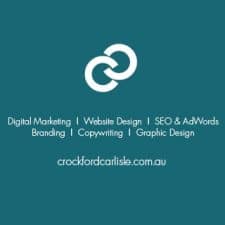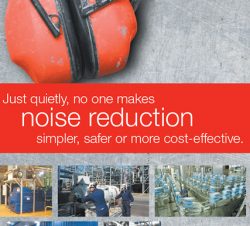The short answer is “Yes!”
Your blog sits right at the top of your Inbound Marketing funnel at the ‘attract’ stage, (attracting potential buyers to your website), and its role in your lead generation strategy cannot be understated.
As an agency, when we develop a digital marketing strategy to generate more qualified leads for a client, having a clear strategy for their blog is something we take very seriously.
And for good reason.

Some quick facts about what your potential customers are doing online:
- Google handles over 100 billion searches a month. (Mashable, 2017)
- The average Google first page result contains 1,890 words. (Backlinko, 2016)
- 50% of search queries are four words or longer. (WordStream, 2016)
- 61% of marketers say improving SEO and growing their organic presence is their top inbound marketing priority. (HubSpot, 2017)
- 71% of B2B buyers start their research with a generic search. (Google, 2015)
- B2B buyers do 12 searches on average prior to engaging on a specific brand's site. (Google, 2016)
- 72% of marketers say relevant content creation was the most effective SEO tactic. (Ascend2, 2016)
The people you want to do business with are sitting at their computers and on their smart phones right now… searching for information that will take them to the best solution to solve their problems.
If you want them to find you, your blog must have content that will:
- Answer questions and provide information that will be found on Google
- Educate potential buyers about the solutions that you offer
- Show them that you have a deep, broad knowledge
- Win their trust in your ability to do the job they require, and
- Engage them, so they are comfortable taking the ‘next step’ with you.
Let me share some insights with you about why our approach works so well, so you can apply some of them to your strategy for generating qualified leads.
To generate qualified leads, you need to think about the Buyer’s Journey when blogging
To improve the effectiveness of your blog as an SEO tool, you and your sales team need to think about your ideal customers — and about the type of questions that they are asking during the buying process.
You then use this as a springboard for content ideas, so that your website is providing the answers and information that they are looking for.
You can learn more about the Buyer’s Journey by downloading this free eBook:
Pro Tip about search terms for blogging:
When you have a list of topics or ideas, it is essential that you research the keywords that people are ACTUALLY using when they search for information about those topics.
It’s easy to make the mistake of using ‘technically correct’ terms for your “stuff” — not realising that your potential buyers may be calling it something else entirely!
One tool that can be helpful for this is Google’s Keyword Planner, which enables you to compare different keyword phrases to see which has the highest volume of searches.
As this example shows, while “fatigue” might be the ‘technically correct’ terminology, people are asking for answers on google with more common terms such as “feeling tired all the time”.
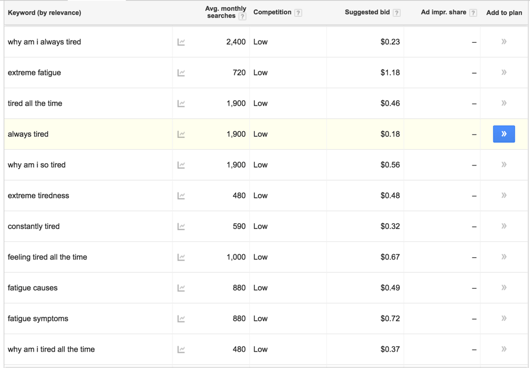
Doing some research can help you to use the correct language in your blog’s URL, headings and content, in turn helping you to reach a wider audience.
Understanding how keyword data fits with the Buyer’s Journey
We’ve used an air conditioning business as an example, but you can apply the same thinking to your own business.
When you first look at the Keyword Planner, you might think that “air conditioner” is the best keyword to use in your blog, as there is a higher search volume for this than the others in the list.
HOWEVER…
The term “air conditioner” is a very broad one. And it is likely to bring traffic from people who are early in the Buyer’s Journey.
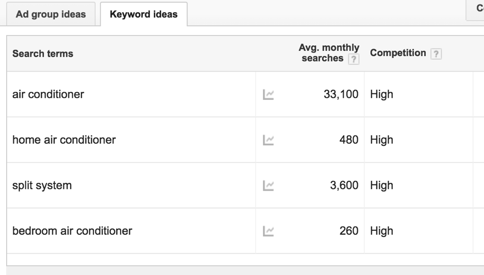
They don’t know much about the subject yet, and are just beginning the process of researching “air conditioning” to figure out what they need.
For that reason, there are a lot of searches for that term, but your conversion rate is likely to be very low. And if they do convert and make an enquiry, these people are not likely to be a qualified lead – yet.
They will be asking really basic questions, and answering them may not be the best use of your sales team’s time.
Moving down the sales funnel…
The people searching for “Home Air Conditioner” are a little further down the funnel.
They may have done some broad searching for “Air Conditioner”, and found sites that offer commercial air conditioning installation and servicing – not what they were looking for.
Learning from this, they will have narrowed their search to “home air conditioning” to find more of what they are interested in.
The chances of them being a qualified lead?
Still pretty low. They are still early in the Buyer’s Journey.
These last two search terms, (“Split System” and “Bedroom Air Conditioner”) are getting more interesting.
While these people are not at the Decision stage, they are well down the track. They know what they want, and are likely to be ready to download information about brands, capacity, pricing, delivery, installation etc.
Whether you would call them a qualified lead just yet depends on your sales process.
But you can see how these people are more likely to be ready to buy, and are well worth some time from your sales team.
Digging a little deeper into keyword research, we found a couple more that could turn out to be gems for an air conditioning business.
Although there isn’t a huge volume of searches for “small room air conditioner” or for “quiet air conditioner”, you can see that these people have moved down the funnel in their research/thinking, and now have a very specific requirement.
Blog content that draws these people to your site could be very profitable indeed!


And for the fun of it, let’s think about that person who is looking for a quiet air conditioner for a moment.
WHY would that be important to them?
It could be that they have trouble sleeping. Or, it could be that they have had a fight with their neighbour over a noisy air conditioner, and are looking for a solution.
In either case, these can be clues you can use to help you develop blog content that can bring these people to your site.
As we said at the beginning, your blog is a key ingredient in your Inbound Marketing strategy, and thinking these things through will be critical to your success.
Check your blog’s data to see which articles are drawing the right kind of enquiry
One of the keys to success with writing blog posts is to use analytics tools, (such as Google Analytics or HubSpot) to look at how each blog post is performing. This helps you keep your blog strategy on track moving forward.
If things are set up correctly, you will be able to see:
- Which blog topics are drawing traffic
- How much engagement there is with each post
- Which topics generate conversions, and
- Which conversions turn into a sale.
This information will help you get a sense of what your market is looking for, and guide you to create more content that gives you a higher ROI.
As you can see in this example, some of the conversion rates from these blog posts are WELL above industry average — where the expectation is around 2% to 3%.
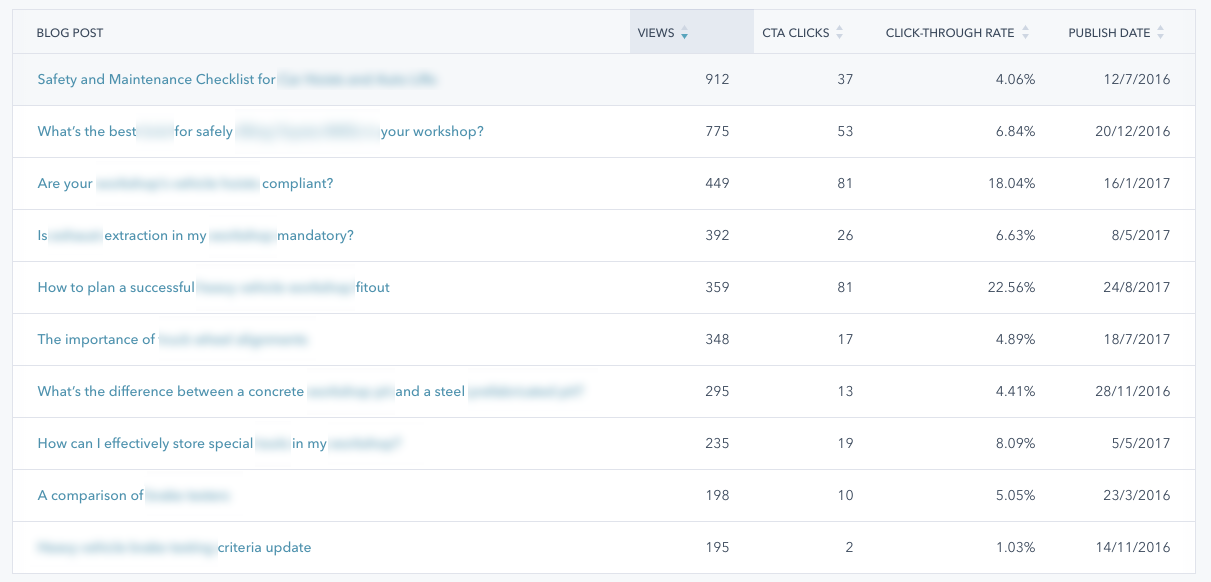
This is because the keywords have been carefully researched and the copywriter has been careful when crafting each blog to use them in the headings and appropriately in the body text.
The content is rich with helpful information which will engage the reader, and furthermore, the Calls To Action on each blog page are relevant — thus encouraging more people to take the ‘next step’ of engaging with a Landing Page.
It is indeed, Inbound Marketing working as it should!
Want more qualified leads for your sales team? Let us help!
Here at Crockford Carlisle, we are happy to take a look at your lead generation strategy with you, and identify where your opportunities are for growth.
Inbound Marketing is a proven strategy that can give you a very high ROI. With our expertise, we can help you to find more of the qualified leads that your sales team needs.
Be assured, you won’t get an “agency sales pitch” when you call.
Instead, you’ll talk to someone who has been around a bit, knows their stuff, and will be genuinely interested in sharing ideas that will be helpful.
Call us on (07) 3891 3800 and we can chat on the phone about your goals, and how you can reach them more quickly.









